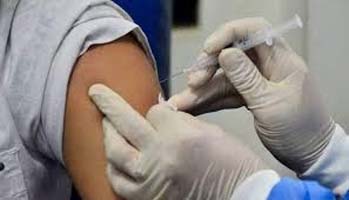NE NEWS SERVICE
AHMEDABAD, DEC 29
Identified ”beneficiaries” are undergoing dummy vaccination at various centres in Gandhinagar and Rajkot districts on the second day of the COVID-19 vaccination dry run on Tuesday, officials said.
The two-day end-to-end dry run was being carried out to test the laid out mechanisms for COVID-19 vaccination and to provide insights into any gaps to be addressed before the commencement of the actual vaccination drive.
Gujarat is one of the four states chosen by the Central government to conduct the mock COVID-19 vaccination drive.
Major highlights this week
After 6 months, active cases are less than 2.7 lakh and still declining
Cumulative positive rate-6.02%
Positivity rate last week-2.25%
INSACOG, a consortium of 10 govt. labs started genome sequencing of SARS-CoV-2 variant: Secy. @MoHFW_INDIA pic.twitter.com/clm51Xez7p
— PIB India (@PIB_India) December 29, 2020
Health workers are among the first ”beneficiaries” identified for the mock vaccination drive being conducted at four health centres in Gandhinagar city.
Explaining the procedure, an official said a dummy vaccination was dispatched from an Urban Health Centre (UHC) to these four booths.
“At each booth, three rooms, each identified to wait, vaccinate and observing, are readied for the beneficiaries who are given dummy vaccination,” an official said.
The Gandhinagar Municipal Corporation (GMC) has identified 125 ”beneficiaries” in the city.
The COVID-19 vaccination dry run consists of several steps like the time taken for dispatch of a vaccine from a centre to a booth; scrutiny of beneficiary details in Co-Win software developed by the Union Health Ministry; training vaccinators; creating facilities for vaccine store among others, officials said.
“We received a list of beneficiaries from Co-Win software. Trained vaccinators have been deputed in three rooms created for different purposes at these booths (identified for the mock drill),” said Dr MH Solanki, Chief District Health Officer, Gandhinagar.
A beneficiary said that the process was easy to understand and everything went smoothly.
“As per the SMS sent to me, I arrived here at 9 am. I first went to the waiting room, where my details were verified. After vaccination, I was given a slip mentioning details, such as my name, time at which I was administered vaccine, contact details in case I need emergency help,” a woman health worker told reporters.
She said a vaccinator explained to her various aspects like the timing of the second dose of vaccine and the COVID-19 protocol she is expected to follow strictly.
I was then directed to a waiting room where I remained under observation for nearly half an hour, the health worker said.
Earlier in the day, the dummy vaccine was dispatched from the UHC located in sector-2 in Gandhinagar to four vaccination centres located at PHC, CHC, civil hospital and a private hospital.
World Health Organisation (WHO) representative Dr Aniket Rana said the dry run was vital and it was being conducted as per the training protocol related to actual vaccination.
“As you know, preparation for vaccines (through the dry run) is important. As part of the training protocol, we offered training for preparedness on aspects like how the software developed for the purpose will work, and other operational aspects to see what all hurdles come in the way and how to resolve them, to ensure smooth run when the actual vaccine arrives,” he told reporters.
He said public participation remained the biggest challenge.
“Even if we are fully prepared, but if people”s participation is not proper, the exercise will fail. We need to build confidence among people so that they can approach us for vaccination with confidence. Operationally, we are prepared…The dry run is aimed to build confidence among the public,” Dr Rana said.
The Gujarat government has identified 19 sites to conduct the dry run.
The Central government will be informed if any gaps are detected during the programme.
In Gandhinagar, a total of 1500 vaccinations have been trained for the purpose.
The state government has already identified 4.31 lakh health workers, 6.93 lakh frontline workers, 1.03 crore citizens above the age of 50 and 2.67 lakh citizens under the age of 50 but with severe comorbidities, such as Thalassemia and heart problems, for the first phase of the actual COVID-19 vaccination.
Gujarat has 2,195 cold chain points at present that can store up to 1 crore doses of coronavirus vaccine, the government had said.












